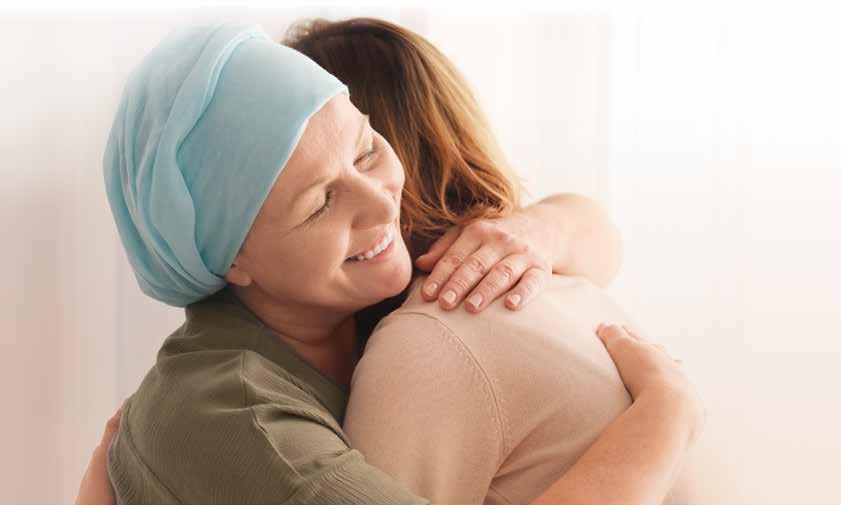
12 minute read
Doing Life Together
Three ways hospice helps not only patients, but their loved ones, too.
By Paula Spencer
Advertisement
Myths about hospice care abound: That it’s just for the last days of life. (People with a prognosis of six months or more are eligible, and many even outlive this form of comfort-care support.) Or that it’s expensive. (Hospice care has been shown to cost less more than conventional medical care, on average, at the end of life.) Or that signing up means “giving up.” (It doesn’t!)
Here’s one more misconception that you may be surprised to learn is untrue: That hospice is just for the dying person. In fact, hospice care is designed to
support the entire family at the end of life.
Hospice is a special concept of care designed to provide comfort and support to patients and their families when a life-limiting illness no longer responds to cure-oriented treatments, according to the Hospice Foundation of America. “And their families” is no casual choice of words.
Here are three ways hospice supports loved ones, too:

Hospice helps relieve overall stress.
Most Americans have limited experience with terminal illness. Coping with difficult medical decisions, fear and worry, and great sadness—usually while trying to continue some semblance of everyday life—can tax anyone. A hospice team tackles the situation with diverse resources, both on site and a phone call away. Net result: Sadness obviously remains, but the shared burden means stress levels plummet. Studies link hospice care to better quality of life not only for the terminally ill, but for their families as well. A study of more than 700 cancer patients, for example, found that whose loved ones died in intensive care units suffered more physical and emotional distress than those whose kin died with home hospice services. When Jennifer Wall Alamdari was 16, her 56-year-old mother was dying of cancer at home in Crutchfield, Kentucky. “My father and I were completely unequipped to take care of her,” she remembers. “It was
such a relief to know that someone skilled was coming to take the weight off of us and that mom was being properly cared for.” Because her dad had another adult to talk to and consult with, Jennifer felt she gained some space “to be a kid again.”
She also learned ways to cope with impending loss. “Our hospice nurse showed me ways to be close to my mom and give her comfort: massaging her hands and feet with lotion, reading to her, buying her a new nightgown, making food that was easy for her to swallow (her throat was raw from the radiation),” she says. “Hospice helped us find ways to be there for her and ourselves.”

Hospice helps with hands-on guidance.
When Alicia Garate-Golembiewski’s mother was dying at her San Francisco home of mesothelioma, a rare form of cancer caused by asbestos exposure, she liked her hospice caregivers so well she called them her “angels.” For Alicia, these angels were teachers as well.
That’s because in addition to providing hands-on care like bathing, changing sheets, and medication dispensing, hospice workers also show curious families how to manage common situations when they can’t be present. “When I would try to lift my mom to take a shower, she’d cringe,” Alicia says. “The nurse would show us how: ‘Put your arm like this, let her move with you, move the sheets this way.’ I loved that they took the time to show us all those little things. And I could call any time with questions—they truly were angels.”
Hospice helps with grief support, both now and later.
Grieving doesn’t begin at a loved one’s death. “Grief started the day Steve was diagnosed,” says Tyra Damm of Frisco, Texas. Her 39-year-old husband of 15 years eventually died of a brain tumor they soon referred to as the “Damm spot.”
The emotional pain of losing a loved one, felt before death, is called anticipatory grief. A 2001 study in The Gerontologist called anticipatory grief equivalent in intensity and breadth to the response to death. It’s real grief—and not surprisingly, it’s very common among those who care for the terminally ill.
Beginning while Steve was in hospice care and for 11 months after he died, hospice grief counselors met with Tyra and her two children, Cooper, then 8, and Katie, 4. The children’s therapy included music and artwork—“things they could control, when they couldn’t control everything else going on,” Tyra says. “They helped me work through things like Steve’s first birthday without him and what was normal for grieving kids when I wondered about how to discipline,” she says.
“I was surprised to get grief help for both me and the kids even before Steve died,” Tyra adds. “We all needed it.”

Paula Spencer is a writer based in San Francisco, CA. When each of her parents used hospice services, she gratefully experienced the hospice care described in this article.

Biggest Lies
We Tell Ourselves
Some of the biggest lies we tell ourselves center around death. We may avoid thinking about mortality by refusing to write a will. We may have no idea what end of life By Katy Butler options our parents or loved ones want when confronted with death because no party involved wants to talk about it. And most of us think that being diagnosed with a terminal illness is simply something that “couldn’t happen to me.”
The truth is that all of us will die. Everyone we love will die. And a large number of us will be diagnosed with a terminal illness before our ultimate demise.
My mother, Dr. Karen J. Warren, describes the questions she had to answer for herself after being diagnosed with a terminal illness. Through the process of self-honesty and evaluation, she hopes that these questions can serve as a practical example of how to use death as a platform to understand yourself and embrace the time that you have left.

—Dr. Cortney S. Warren, PhD, ABPP
Iam dying. Unless I get hit by a truck, I know how I will probably die. And it won’t be pretty.
I was diagnosed with a terminal illness called Multiple Systems Atrophy (MSA). It is a fatal, progressive brain disorder that affects the neurological body functions such as swallowing, digestion, and blood pressure.
Learning I had MSA was a blow. I was scared. Angry. Sad. I thought, “Okay, I have this disease. Now what do I do? What do people do when they learn they have a terminal illness? How do I proceed with my life?”
Looking back, I see that my process for dealing with my MSA diagnosis involved answering seven questions. These questions may be helpful to anyone diagnosed with a terminal illness and their loved ones as they move forward from the diagnosis.
1. Whom should I tell about my illness?
When I was first diagnosed, I had to figure out who to tell—and how.
I began by telling those I am emotionally close to—my daughter, my siblings, and my dearest friends. Then, I told people who needed to know because I would need their assistance to “put my affairs in order”—my lawyer, financial advisor, accountant,
and various healthcare providers.
When you tell people, they will want more information. Like me, they had never heard of MSA. And like me, they were full of questions that I could not answer. There may be conflicting emotions. It’s important to remember that you don’t owe anyone information. Tell who you want or need to tell, and don’t feel pressured to tell anyone else.
2. What do I need to prepare for life moving forward?
Once I told a few people of my health news, I felt totally overwhelmed. I am a single mother who has lived alone for almost 25 years. I was comfortable with that—until I was diagnosed with MSA. Now, the reality of living alone was terrifying because I now knew I would need help beyond what is provided by physicians and health care practitioners.
Overwhelmed by this question, I turned to my primary care physician for help. I asked her, “Who will take care of me? What do I need to ensure that I am cared for?” Her answer: “You need a case manager.”
My first phone conversation with my case manager was just what I needed. She encouraged me to make choices about what I want to do with the rest of my life and to figure out how to give life meaning as a dying person.
That stumped me. As a retired philosophy professor, surely I was capable of knowing what gives my life meaning. But, in fact, I didn’t really know. So I began by asking myself what I really cared about and wanted to do.
3. What do I want?
For most of my life, I have done what I needed to do or what I should do. Now the question was about what I wanted to do.
Listening to others who were dying from a terminal illness, I realized that often what many of us want is just to do ordinary things—wash the dishes, clean the house, go for walks, work in the gardens, go for a swim, or use an exercise machine. Most importantly, we want to be with the people we love.
For me, this meant spending time with loved ones doing what they loved doing. During this past year, I have gone to an opera, The Ryder Cup golf tournament, Vikings football games, a glorious day at a spa, Hawaii, and Florence, Italy—all with my treasured family members.

4. What really matters?
After several months of living with my illness, I knew that what gives my life meaning, what really matters to me, are relationships—relationships with myself, with other people, with animals, and with the natural world. Creating and nurturing these relationships is what I value most.
How does this translate into how I live my life going forward? It comes down to this: When I am no longer able to communicate or have interactive relationships with others, my life will have lost all meaning to me. When I am nearing the end of life, I want to be permitted to die. I have an Advanced Care Directive that specifically states which medical treatments I do—and do not—want when I get close to dying. Ultimately and unequivocally, I want end-of-life options that permit me to have medical aid-in-dying.
5. Do I have time for this?
The precious time I have left matters! I found myself asking, “Will doing this or
saying that make a positive difference to my health or enhance my well-being?” For example, does it make a difference to me whether I participate in a research program, take an X-ray, or have a mammogram? My guiding principle has been this: “If doing something makes a positive difference in my life or enhances my well-being, then do it; If it doesn’t, then don’t do it.”
6. Will this action enhance my quality of life?
Medical professionals (and others) often suggest to people with a terminal illness that we can and should do things that enhance our quality of life. But what does that mean? I don’t know, exactly. But there are many practical things I can do that enhance my day- to-day living. For example:
Save the cards, letters, emails, and text messages people send you.
They are living eulogies—eulogies before you die—that you can read and enjoy now. Post updates about your heath and experiences on a website designed expressly for interaction between you and those who care about you (such as Caring Bridge). Find a support group—for you and your caregiver(s). There really is no substitute for being with others with the same challenges.
Invariably, they’ll provide helpful information of the “this is something I do” nature. Write letters to your family and friends that they will have after you die. I am writing “electronic love letters” to my two grandchildren.
Every few months I make a video recording for each one. Plan to do something fun or pleasing each day. Do something new, especially if it nudges you to overcome the
“What will people say?” question. Schedule activities to look forward to. It really makes a difference to one’s mood and quality of life.

7. What can I do to help others in my position?
Being diagnosed with a terminal illness is tough. In the midst of the emotional process of dealing with the illness, there are a number of legal issues we all encounter as we die—including, most importantly, medical aid-in-dying options. For me, this came in the form of supporting legislation to legalize end-of-life options for the terminally ill. For others, it may be another type of engagement. Staying connected to a social group or cause is helpful on many levels.
Conclusion
Although there are challenges with having a terminal illness, there are also great gifts.
I have time to prepare for dying— for example, by giving away things I don’t need, doing things I love but may have neglected, renewing relationships with old friends, healing unresolved conflicts, and ensuring that I am comfortable with my relationships before I die.
Additionally, I now understand that I am dying and I am living. Dying is a part of living and living is a part of dying. Every day, I remind myself that knowing I am dying offers me the opportunity to be my best self and to spend the time I have left living fully in the present.
Finally, the most significant gift was totally unexpected: Sometimes, I am happier than I have ever been, perhaps because I have let go of the past and the past has let go of me. It simply isn’t relevant anymore. I live more centered in the present moment than I ever have, and I am just plain happy to be here—right now. —Dr. Karen J. Warren, PhD. 1947–2020.
Dr. Cortney S. Warren, PhD, ABPP, is the daughter of Karen Warren. She is a boardcertified clinical psychologist and Adjunct Clinical Professor of Psychiatry at the University of Nevada School of Medicine. For more information visit ChooseHonesty.com

